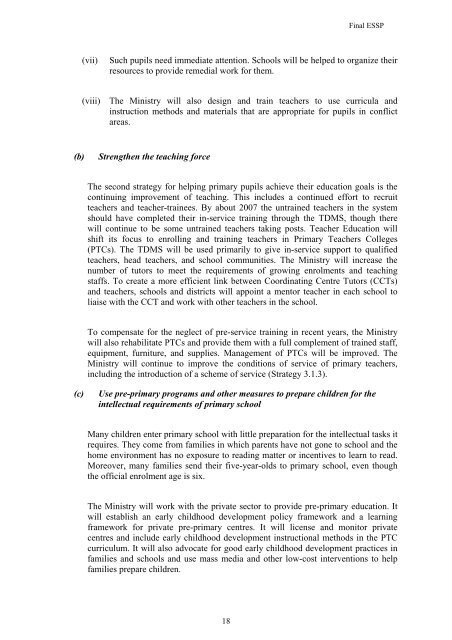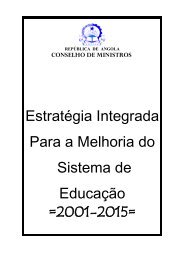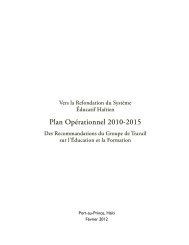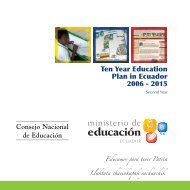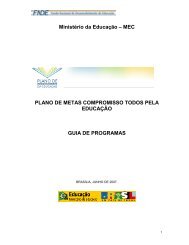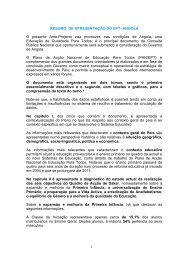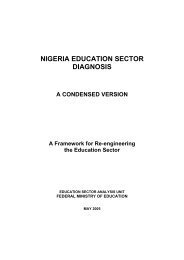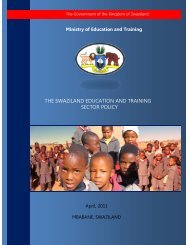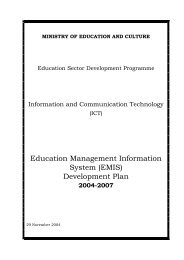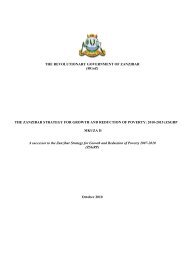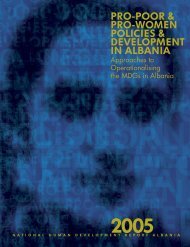Education Sector Strategic Plan 2004-2015 - Planipolis
Education Sector Strategic Plan 2004-2015 - Planipolis
Education Sector Strategic Plan 2004-2015 - Planipolis
Create successful ePaper yourself
Turn your PDF publications into a flip-book with our unique Google optimized e-Paper software.
Final ESSP<br />
(vii) Such pupils need immediate attention. Schools will be helped to organize their<br />
resources to provide remedial work for them.<br />
(viii) The Ministry will also design and train teachers to use curricula and<br />
instruction methods and materials that are appropriate for pupils in conflict<br />
areas.<br />
(b) Strengthen the teaching force<br />
The second strategy for helping primary pupils achieve their education goals is the<br />
continuing improvement of teaching. This includes a continued effort to recruit<br />
teachers and teacher-trainees. By about 2007 the untrained teachers in the system<br />
should have completed their in-service training through the TDMS, though there<br />
will continue to be some untrained teachers taking posts. Teacher <strong>Education</strong> will<br />
shift its focus to enrolling and training teachers in Primary Teachers Colleges<br />
(PTCs). The TDMS will be used primarily to give in-service support to qualified<br />
teachers, head teachers, and school communities. The Ministry will increase the<br />
number of tutors to meet the requirements of growing enrolments and teaching<br />
staffs. To create a more efficient link between Coordinating Centre Tutors (CCTs)<br />
and teachers, schools and districts will appoint a mentor teacher in each school to<br />
liaise with the CCT and work with other teachers in the school.<br />
To compensate for the neglect of pre-service training in recent years, the Ministry<br />
will also rehabilitate PTCs and provide them with a full complement of trained staff,<br />
equipment, furniture, and supplies. Management of PTCs will be improved. The<br />
Ministry will continue to improve the conditions of service of primary teachers,<br />
including the introduction of a scheme of service (Strategy 3.1.3).<br />
(c) Use pre-primary programs and other measures to prepare children for the<br />
intellectual requirements of primary school<br />
Many children enter primary school with little preparation for the intellectual tasks it<br />
requires. They come from families in which parents have not gone to school and the<br />
home environment has no exposure to reading matter or incentives to learn to read.<br />
Moreover, many families send their five-year-olds to primary school, even though<br />
the official enrolment age is six.<br />
The Ministry will work with the private sector to provide pre-primary education. It<br />
will establish an early childhood development policy framework and a learning<br />
framework for private pre-primary centres. It will license and monitor private<br />
centres and include early childhood development instructional methods in the PTC<br />
curriculum. It will also advocate for good early childhood development practices in<br />
families and schools and use mass media and other low-cost interventions to help<br />
families prepare children.<br />
18


